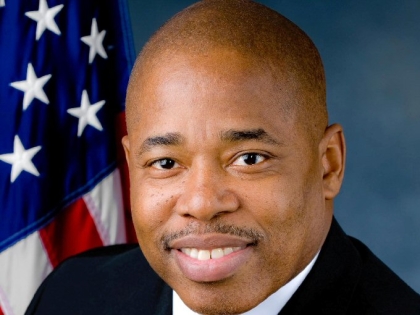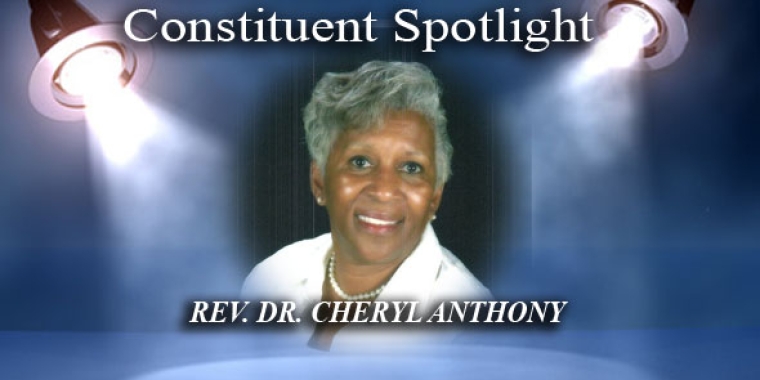
Senator Adams' Albany Update Letter and FAQ's (July 6)
Eric Adams
July 6, 2009
Click on READ MORE for full letter and FAQ's...
Dear Constituent:
One of my favorite pastimes is working on a community garden project. I find it particularly rewarding labor, although it does come with the challenging task of continually fighting pesky weeds. No matter what you do, they always pop up somewhere among the desired trees and flowers.
I reached a point during one summer when I was tempted to use some powerful vegetation killer, risking the possibility of destroying everything that grew just so I could obliterate the weeds. The reality was that this ill-conceived attempt at a quick fix was driven by frustration. My goal had never been to wipe out all the vegetation, but to target and eradicate only the weeds that harm the garden. The removal does not guarantee that the weeds won’t return, but it demands that the gardener remain vigilant.
I recount this story because of its relevance to what is occurring in our State’s capital. As voters, you are the gardeners. And there are many “weeds” in the form of ineffective politicians throughout our entire country, not only in Albany. Many of these undesirable “weeds” use their power to be served and not to serve.
I am not one of them! I take enormous pride in what I have achieved as a police officer and as a NYS Senator. I am not a “weed” that must be plucked and discarded, a negative element in the drama being played out in the NYS Senate.
There is much to be accomplished in state government, and an evaluation of my ability to contribute to political reform should not be based on the last twenty-odd days, but on the last twenty-two years of commitment to making my city and state a safe place to raise children and nurture families.
During this time of turmoil, I find it useful to borrow from the SYMS philosophy of government: “An educated consumer is our best customer.” Instead of allowing the daily tabloids to shape the story with their distortions, I have used modern technology to give you an insight into what has transpired, what is occurring now, and what needs to happen.
This communication is a continuation of that methodology. Based on many phone calls, emails, letters, and conversations, I have created the following list of thirteen frequently asked questions:
1. QUESTION: WHY IS THE TERM MINORITY CONFERENCE OR MAJORITY CONFERENCE USED TO DESCRIBE A GROUP OF SENATORS?
ANSWER: The terms convey information about the number of senators in each party. The party with the larger number is called the Majority Conference and the party with the lesser is called the Minority Conference. Majority senators have a greater influence in directing the business of the Senate and they normally control committee chairmanships.
Currently, Senator Smith and my colleagues compose the Majority Conference and Senator Skelos and his colleagues are the Minority Conference.
2. QUESTION: WHY WAS THE JUNE 30TH DATE IMPORTANT IN NY STATE?
ANSWER: On June 30th many important laws were going to sunset (expire) if they were not renewed by the State Senate. These included school governance (in NYC) and Power for Jobs. Both the Senate Majority and Minority agreed on renewal of many items and simply needed to cast ballots on them. My colleagues and I spent many hours in the Senate Chamber and voted on every important initiative. Unfortunately, Senator Skelos and the Minority refused to participate.
3. QUESTION: WHY DID SENATE MAJORITY LEADER MALCOLM SMITH DECIDE TO STOP PRIVATE NEGOTIATIONS WITH SENATE MINORITY LEADER DEAN SKELOS AND SENATOR PEDRO ESPDA?
ANSWE: After 2 weeks of unsuccessful attempts to negotiate with Senate Minority Leader Skelos and Senator Pedro Espada, it became clear that they were primarily concerned with job titles and power and uninterested in addressing pressing legislation before the June 30th deadline. They hid their true motivation with a public display very different from their posture behind closed doors. It was our decision, therefore, to hold negotiations in public to enable the people of the State to witness the cause of the stalemate. We believe the transparency inherent in public dialogue results in a more educated voter.
4. QUESTION: WHY DOES SENATE MINORITY LEADER SKELOS REFUSE TO ENTER THE CHAMBER AT THE SAME TIME AS THE MAJORITY CONFERENCE?
ANSWER: After the leadership dispute, Majority Leader Malcolm Smith and our conference went to court to have the conflict resolved. The judge ruled that the leadership issue must be worked out by the Senate itself. Senator Skelos and his conference, however, have refused to acknowledge that ruling and continue to demand recognition of Pedro Espada as Senate President pro tem.
5. QUESTION: WHY IS THE POSITION OF PRESIDENT PRO TEM IMPORTANT?
ANSWER: This constitutional position gives the individual with this title several critical roles in the Senate and in the State. First, the President pro tem is Acting Governor whenever the Governor is incapacitated or leaves the state. In addition, the President pro tem controls the millions of dollars in resources allocated to running the NYS Senate.
This position is voted on by the full Senate body, and normally the party with the largest number of members elects both the President pro tem and the Majority Leader. (The President pro tem usually also holds the title of Majority Leader and decides who will preside over the Senate.)
As it stands now, each side has 31 votes, so the Senate is tied.
6. QUESTION: WHY IS PRESIDING OFFICER AN IMPORTANT POSITION?
ANSWER: Inside our governmental chamber, a single individual acts like a traffic cop. His or her role is to control the proceedings and rule on issues such as who will speak, which items will be voted on, etc. This position ensures the orderly running of the Chamber and is thus extremely important. In the State Senate, the Majority Leader/President pro tem decides who will hold the gavel as presiding officer.
7. QUESTION: HOW ARE TIE VOTES NORMALLY HANDLED?
ANSWER: Normally, tie votes are decided by the Lt. Governor. Unfortunately, NYS currently has no Lt. Governor because that office became vacant when Governor Paterson replaced the resigned Governor Spitzer.
Other states have handled a tie in a legislative body by instituting a temporary “power sharing agreement.” In our attempt to move the state’s business forward, we presented a proposal for such an agreement to Senators Skelos and Espada, but they rejected this compromise.
8. QUESTION: WHY DID GOVERNOR PATERSON CALL A SPECIAL SESSION?
ANSWER: In an attempt to compel the two sides to enter the Senate chamber simultaneously and vote on pending legislation, Governor Paterson used his gubernatorial power to convene a special session.
Senator Smith and my colleagues adhered to the governor’s order, but Senator Skelos and his conference staged a boycott. Their attempt to nullify the session failed when a judge threw out their lawsuit and ruled in favor of the governor. After losing their appeal, Senator Skelos and his conference entered the Chamber, but they refused to vote on any bills.
(Governor Paterson’s constitutional authority could only compel them to enter the Chamber, but he could not force them to vote on legislation. Senator Smith and my colleagues worked in the Chamber from 10:00 am until 8:30 pm, and we hope the Governor will sign the legislation that we passed.)
9. QUESTION: WHY DIDN’T MAYORAL CONTROL PASS (as of July 3rd)?
ANSWER: In order for a bill to become law, both Houses (Assembly and Senate) must pass it. The Assembly voted on its version, but the Senate was unable to take up the bill because of the June 8th incident. Majority Leader Smith and my colleagues hope to convince Senator Skelos to enter the chamber, negotiate important revisions (e.g. increased parental participation, greater oversight), and enact this legislation.
10. QUESTION: HOW DOES THE SENATE CRISIS IMPACT UPON OUR DISTRICT?
ANSWER: In 2009, the state senate changed leadership for the first time in more than forty years. The change ushered in a new philosophy and allocation of resources. For the first time in over four decades, certain significant legislation (such as regulations concerning tenants’ rights issues) would have had an opportunity to become law. These important matters are now stalled by the Senate stalemate. In addition, the allocation of major financial resources to support community- based organizations has also been delayed.
11. QUESTION: WHY ARE NYS SENATORS GETTING PAID FOR NOT WORKING?
ANSWER: A Senator has many duties. Enacting legislation is only one aspect of the job, and while of paramount importance, it takes up the least amount of time. I cannot speak for all Senators, but those of us who represent high-needs districts routinely put in 10 to 12 hour days.
Our daily calendar includes spending many hours addressing the needs of our constituents, holding individual consultations, attending community meetings, responding to emergency situations, and speaking at ceremonies (like graduations). Even during this Albany crisis we still are in our offices handling the very many aspects of our total duties.
The pay that everyone asks about is an allocation called a per diem. It is a $160 daily allotment the government pays to state legislators to defray the cost of food and lodging while away from home in Albany. I have already announced that I will donate my per diem to a charitable organization.
State legislator is deemed a part time job because session runs from January to June. Trust me, my friends, this job is not part time for senators who are committed. During the summer, my district calendar is jam-packed with events my office sponsors to make our community an attractive place to raise children and nurture families.
12. QUESTION: WHAT IS SENATOR ERIC ADAMS DOING TO RESOLVE THIS ISSUE?
ANSWER: It was essential to me that my colleagues and I return to the Senate Chamber. I spoke with Majority Leader Smith and my colleagues and convinced them that we must be in Chamber and lead by example. They agreed, and we have been there every day since the court rulings.
In addition, one of the most important things I did when I first arrived in Albany three years ago was to reach out to my colleagues in the other party. We have developed a professional and cordial relationship. I am availing myself of that rapport to meet and discuss how best to convert this hostile environment into a working bi-partisan senate. I believe we have made some significant progress, and I hope it can be fruitful in ending this stalemate.
13. QUESTION: WHAT CAN THE PUBLIC DO TO BE HEARD?
ANSWER: The major sticking point is the issue of leadership. Senator Smith and my colleagues all agree that we must move that question to the side and focus on the important bills that are before the Senate. We can address the leadership question during the summer, and we have six months before the next session to resolve it.
If the public joins our call for a bi-partisan power sharing agreement, I believe Senator Skelos and his colleagues will pay heed. Reach out to your family members and friends. Have them communicate (via email, letter, call, or visit) with Minority Leader Skelos and his colleagues to urge a return to Chambers to conduct the people’s business.
Sincerely,
Eric Adams
NYS Senator
District #20
PS- During the Albany stalemate, I will conduct a weekly conference call each Thursday to update you and answer all your questions. Please call 218-844-8230. When prompted for an “access code”, please punch in 406617# to join the conference. There will be two sessions: 6:45pm-7:45pm and 8:15pm-9:15pm.
Share this Article or Press Release
Newsroom
Go to NewsroomL'Shana Tova Greeting from Senator Adams
September 4, 2013


Senator Adams attends Seasme Flyers International Street Fair
September 3, 2013
September Constituent of the Month: Reverend Dr. Cheryl Anthony
September 2, 2013
